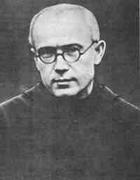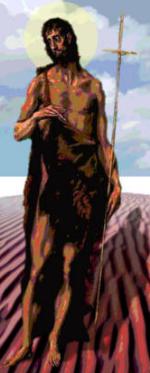The Third Sunday of Advent
[Scripture Readings: Is 61:1-2, 10-11; 1 Thess 5:16-24; Jn 1:6-8, 19-28]
 Sometimes everything in life suddenly changes, especially when we face an untimely death without hope of rescue. At the memorial museum in Dachau’s concentration camp there is a heartbreaking photograph of a mother surrounded by several small children walking to the gas chamber. She seems to understand they are in mortal danger but is powerless to stop the tragedy. In desperation she performs the only act of love left to her. She bends over and gently places her warm hands like a little blanket over the eyes of the child walking in front of her, preventing at least one of her children from seeing the horror that is ahead.
Sometimes everything in life suddenly changes, especially when we face an untimely death without hope of rescue. At the memorial museum in Dachau’s concentration camp there is a heartbreaking photograph of a mother surrounded by several small children walking to the gas chamber. She seems to understand they are in mortal danger but is powerless to stop the tragedy. In desperation she performs the only act of love left to her. She bends over and gently places her warm hands like a little blanket over the eyes of the child walking in front of her, preventing at least one of her children from seeing the horror that is ahead.  People coming into the museum are riveted by this photograph of a Jewish family on the day they died. They had no hope of rescue when the lights were turned off in the fake shower room and they heard the hissing sound of gas instead of water coming through the shower heads. Later their lifeless bodies were consumed in the flames of the crematorium and turned into a heavy black smoke that covered the ground with their ashes. Untimely death without hope of rescue is a dreadful thing. In mid-August of the year 2000 it happened by accident when 116 Soviet sailors died in a sunken nuclear submarine. On 9/11 of last year it happened by terrorism when several thousand Americans died in the horrifying collapse of the Twin Towers. Advent marks the moment in history when everything suddenly changed in favor of life, when John the Baptist first proclaimed that the Lord was coming.
People coming into the museum are riveted by this photograph of a Jewish family on the day they died. They had no hope of rescue when the lights were turned off in the fake shower room and they heard the hissing sound of gas instead of water coming through the shower heads. Later their lifeless bodies were consumed in the flames of the crematorium and turned into a heavy black smoke that covered the ground with their ashes. Untimely death without hope of rescue is a dreadful thing. In mid-August of the year 2000 it happened by accident when 116 Soviet sailors died in a sunken nuclear submarine. On 9/11 of last year it happened by terrorism when several thousand Americans died in the horrifying collapse of the Twin Towers. Advent marks the moment in history when everything suddenly changed in favor of life, when John the Baptist first proclaimed that the Lord was coming.
It is like the moment when nine coal miners in Pennsylvania first heard they would be rescued. On Wednesday evening, last July 24th, 240 feet below the beautiful landscape of Somerset County, the miners were using a grinding machine with a hundred steel teeth on a revolving cylinder chewing into a seam of coal. Suddenly the wall broke open and a torrent of 50 million gallons of water shot into the tunnels. The miners fled for their lives but the explosion of water rolled passed them, cutting off any escape. The men backtracked in tunnels that were only four feet tall, and they were barely able to keep their heads above water until they found a large air pocket at a slightly higher level. Rescue workers on the surface used global positioning satellites to find the right spot for drilling a six inch air pipe. Eight hours after the breech they succeeded. The air pipe went right into the tunnel of the trapped miners who responded by striking the metal pipe nine times, one for each man. But the water was still rising. They were forced to retreat to the highest accessible level, an area of compressed air and dry ground about 18 feet wide and 30 feet long. One of the crew estimated they only had a few hours to live before the black water would cover them.  By the light of their helmets each man wrote a note to his loved ones and put it in a sealed container. The hours passed and they were still alive. The water had stopped rising but how long could they survive? They turned off their helmet lamps to conserve power and waited quietly in the darkness, shivering in their soaked clothes, and praying. It took over three days for a rescue shaft to be drilled into the tunnel next to the air pipe. Near midnight on Saturday a probe with a microphone and speaker was lowered through the larger shaft. Then the miners heard a voice cry out in the darkness across the top of the water announcing that rescue was at hand. Suddenly everything changed in favor of life. One of the men said he has only cried for joy twice in his life: first, when his son was born, and second, when he was rescued.
By the light of their helmets each man wrote a note to his loved ones and put it in a sealed container. The hours passed and they were still alive. The water had stopped rising but how long could they survive? They turned off their helmet lamps to conserve power and waited quietly in the darkness, shivering in their soaked clothes, and praying. It took over three days for a rescue shaft to be drilled into the tunnel next to the air pipe. Near midnight on Saturday a probe with a microphone and speaker was lowered through the larger shaft. Then the miners heard a voice cry out in the darkness across the top of the water announcing that rescue was at hand. Suddenly everything changed in favor of life. One of the men said he has only cried for joy twice in his life: first, when his son was born, and second, when he was rescued.
When the voice of John the Baptist cried out in the wilderness that the Lord was coming, everything suddenly changed in favor of life. Christ came to save us from sin and make us sharers in his own divine life that never ends. For the children of God an untimely death without hope of rescue is not the end of everything. It is an earlier beginning of eternal life. At about the same time as the Jewish mother and her young children died at Dachau, St. Maximilian Kolbe willingly accepted an untimely death at Auschwitz. He took the place of a fellow prisoner condemned to die by starvation in reprisal for one who escaped.
 To die at all is a dreadful fate, timely or untimely. It’s hard not to be afraid of it. Can anyone, other than the saints, approach death with the tranquillity and happiness of Fr. Kolbe? Saint Gertrude the Great, a mystic in 13th-century Saxony, received a comforting assurance from Christ concerning the moment of death. He said to her, “When I behold anyone in agony who has thought of me with pleasure, or performed any works deserving reward, I appear at the moment of death with a countenance so full of love and mercy that the sinner will repent from the heart for ever offending me, and will be saved.”
To die at all is a dreadful fate, timely or untimely. It’s hard not to be afraid of it. Can anyone, other than the saints, approach death with the tranquillity and happiness of Fr. Kolbe? Saint Gertrude the Great, a mystic in 13th-century Saxony, received a comforting assurance from Christ concerning the moment of death. He said to her, “When I behold anyone in agony who has thought of me with pleasure, or performed any works deserving reward, I appear at the moment of death with a countenance so full of love and mercy that the sinner will repent from the heart for ever offending me, and will be saved.”
Gerard Manley Hopkins was so encouraged by this promise that he wrote it out in verse: “To him who ever thought with love of me, or ever did for my sake some good deed, I will appear looking such charity and kind compassion at his life’s last need, that he will out of hand and heartily, repent he sinned, and all his sins be freed.”
The Lord did not come to save us from untimely deaths or to prolong our lives a few more years. Our need and his rescue is much greater. He takes all the harm out of death. When our time comes to die, Christ will be like a tender mother walking with us to this life’s mortal end. At the right moment he will lift the little blanket covering our eyes to let us see the joy that is coming, and he will fill us with such happiness by his loving countenance that we will run to him.
For the children of God “the day of death is when two worlds meet with a kiss: this world going out with the future world coming in.”

The Third Sunday of Advent
[Scripture Readings: Is 35: 1-6a, 10; James 5:
7-10; Mt 11: 2-11.]

Be on the lookout for the front man, the point man who knows what to say and what to do. He has information that is sound, solid, and salutary. He not only counsels the civilian population but military personnel as well. He is noted for his honesty, integrity, probity and total disregard of persons in high places, even those of the religious ministry. Comforting the afflicted and afflicting the comfortable shows up on his résumé. Never at a loss for words, he becomes a magnet that draws the iron filings who are marginalized, discontented, oppressed, perplexed and disconsolate. The full catastrophe of the dregs of human condition find a welcome in his message and conduct.
Such was John the Baptist, who finally wound up in prison because he was faithful to the truth. Even Herod, disturbed as he was, liked to listen to him. John could tell him things others did not dare to bring up in his presence.
In the Gospel today, how is it that John inquired of those who came to him in prison if Jesus was really the one that was to be expected? One would think that John had all the evidence he needed when he John baptized him in the Jordan. It did not last long, but it seemed sufficient to consolidate his mission in life. This was before the public ministry of Jesus. It is possible that John never heard or saw Jesus perform miracles because he was in prison.

Faith comes through hearing and his disciples who heard and saw Jesus in action were altogether suitable to render testimony. The message and the miracles confirmed that here was a man sent from God who has something to teach about the way to please God and attain eternal salvation.
During this Advent season we are granted readings at Mass and the Divine Office to prepare for the great solemnity of Our Lord’s Nativity. That he should come in the way of an infant rather than appearing all at once as a full grown man is indeed a mystery that helps us respect human life in all its forms from the moment of conception.
Christ, the light of all lights, follows John, the lamp goes before him. The Word of God follows the voice in the wilderness. The bridegroom follows the bridegroom’s friend. John was ready to face his execution. Jesus would learn to do the same. In this Advent season, let us expect Jesus to come into our hearts and minds in a way we will not shun whatever life has to offer. The front man points to the light that will never fail.
The Third Sunday of Advent
[Cycle C Scripture Readings: Zeph 3:14-18a; Phil 4:4-7; Lk 3:10-18]

Certainly one of the messages that is repeated throughout the Advent liturgy is that the Lord is near. What does that mean? John the Baptist announces a double proclamation: the wheat will be gathered into the Lord’s granary and the chaff will be burned. The nearness of the Lord announces a time of both anxiety and hope. Our situations differ from those of the crowds and the tax collectors and the soldiers that came to John the Baptist. Our situations differ among ourselves. But sad to say anxiety seems to be the common human lot. It transcends time and geography. Anxiety may be a specific fear that I can point to, or it may be a diffuse apprehension that cannot be put into words. In either case we can share in the question put to John the Baptist: What are we to do?
In view of the dramatic buildup of John as the eschatological prophet announcing the long awaited Day of the Lord, his answers to those who question him can seem anticlimactic. He doesn’t say anything that calls for heroic effort or exceptional skill or for any outstanding achievements. He tells them to be kind to one another. He tells them to conduct their daily affairs with justice and not to take advantage of those who are in a more vulnerable position. Writing after the coming of the Lord, Paul has a similar message for the Philippians. Because the Lord is near they are not to be anxious, rather they are to be joyful. They are to present their needs to God in prayer and be at peace. Zephaniah’s message to the 7th century Hebrews is to rejoice and not be afraid, because God is in their midst.
 If anxiety is a common human experience, hope can be too. This morning’s readings tell us that hope is to be found in our everyday experiences. We need not spend our efforts on elaborate plans that try in vain to predict and control the future. We are told to put the gospel into practice. This is difficult, but in Christ it is not beyond the abilities of any of us. Nor does the gospel tell us that we will not encounter pain and difficulty. On the contrary, it assures us that we will. Hope does not deny suffering, but it is not dependent on any set of circumstances. Hope comes from God’s presence among us. Christ has promised that he will be with us and he calls us to follow him.
If anxiety is a common human experience, hope can be too. This morning’s readings tell us that hope is to be found in our everyday experiences. We need not spend our efforts on elaborate plans that try in vain to predict and control the future. We are told to put the gospel into practice. This is difficult, but in Christ it is not beyond the abilities of any of us. Nor does the gospel tell us that we will not encounter pain and difficulty. On the contrary, it assures us that we will. Hope does not deny suffering, but it is not dependent on any set of circumstances. Hope comes from God’s presence among us. Christ has promised that he will be with us and he calls us to follow him.
Anxiety is not inevitable. Hope is not automatic. Anxiety does not disappear by our wishing it to and our hope may be weak. Nevertheless we can grow in hope, and as our hope becomes stronger the hold that anxiety has on us becomes weaker. The Advent liturgy calls us again and again to renew our hope. The Lord is near. He is present in his word. He is present in his sacraments. He is present among us as we gather in his name to honor him. Let us open our hearts to welcome him.
